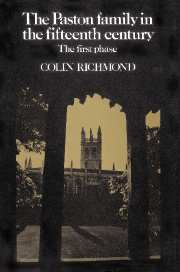Book contents
- Frontmatter
- Contents
- List of genealogical tables
- Preface
- Acknowledgements
- List of abbreviations
- Chronological table
- 1 The origins of the Pastons
- 2 Land: acquisition and defence
- 3 East Beckham
- 4 Three marriages
- 5 Relations: the Garneys and the Berneys
- 6 The deathbed of William Paston and its consequences
- 7 Sir John Fastolf and John Paston
- Conclusion
- Index
6 - The deathbed of William Paston and its consequences
Published online by Cambridge University Press: 26 December 2009
- Frontmatter
- Contents
- List of genealogical tables
- Preface
- Acknowledgements
- List of abbreviations
- Chronological table
- 1 The origins of the Pastons
- 2 Land: acquisition and defence
- 3 East Beckham
- 4 Three marriages
- 5 Relations: the Garneys and the Berneys
- 6 The deathbed of William Paston and its consequences
- 7 Sir John Fastolf and John Paston
- Conclusion
- Index
Summary
If, as the Russians say, the end crowns the matter, that is, the manner of a man's dying strips his personality bare, we may observe from the accounts of the deathbed of William Paston that he was indecisive, inefficient, and indifferent to the interests of his family. Also, he was negligent, lacked vision, could not discern character, had neither shrewdness nor insight, perspicacity nor sensitivity. Precisely the qualifications, the cynic would maintain, of a judge, particularly of a good judge. On his deathbed William Paston was a poor judge: of everything. To the pig's ear he made of ending his successful life we will return, but one conclusion is both inescapable and irresistible: what a simple matter it is to make money, especially from the weaknesses of men and women, how difficult to discover their strengths and to ensure that they are sustained and developed.
The no more than thirty documents among the Paston letters which survive from William Paston's life before its last moments reveal little. They show us what a busy man he was: yet another of those capable lawyers who appear to dominate fifteenth-century English life; ‘appear to’ because of the quantity of paper their business generated. It would be tedious to list all those (all those we know of) whose feoffee or executor he was – uninstructive as well as tedious.
- Type
- Chapter
- Information
- The Paston Family in the Fifteenth Century , pp. 167 - 205Publisher: Cambridge University PressPrint publication year: 1990



